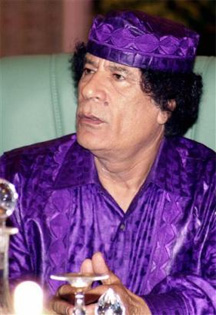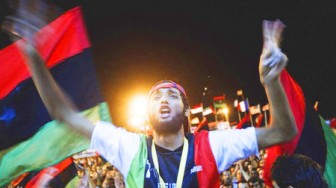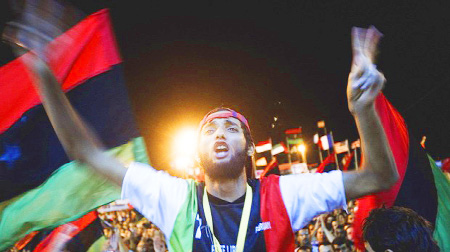TRIPOLI, (Reuters) – Jubilant rebel fighters streamed into the heart of Tripoli as Muammar Gaddafi’s forces collapsed and crowds took to the streets to celebrate, tearing down posters of the Libyan leader.

Rebels waving opposition flags and firing into the air drove into Green Square, a symbolic showcase the government had until recently used for mass demonstrations in support of the now embattled Gaddafi. Rebels immediately began calling it Martyrs Square.
Earlier, a convoy of rebels entered a western neighbourhood of the city. Rebels said the whole of the city was under their control except Gaddafi’s Bab Al-Aziziyah stronghold, according to al-Jazeera Television.
Two of Gaddafi’s sons were captured by the rebels, who were also reported to have seized the Libyan state radio building in the capital. Gaddafi’s presidential guard units laid down their arms.
Remaining defiant, Gaddafi earlier had made two audio addresses over state television calling on Libyans to fight off the rebels.
“I am afraid if we don’t act, they will burn Tripoli,” he said. “There will be no more water, food, electricity or freedom.”
But resistance to the rebels appeared to have largely faded away, allowing the rebels and their supporters to demonstrate in Green Square.
Televised images showed Libyans kneeling and kissing the ground of Tripoli in gratitude for what some called a “blessed day”.

Many Tripoli residents received a text message from the rebel leadership saying: “God is Great. We congratulate the Libyan people on the fall of Muammar Gaddafi.”
Gaddafi, a colourful and often brutal autocrat who has ruled Libya for more than 40 years, said he was breaking out weapons stores to arm the population. His spokesman, Moussa Ibrahim, predicted a violent reckoning by the rebels.
“A massacre will be committed inside Tripoli if one side wins now, because the rebels have come with such hatred, such vendetta…Even if the leader leaves or steps down now, there will be a massacre.”
NATO, which has backed the rebels with a bombing campaign, said the transition of power in Libya must be peaceful.
TRIPOLI FALLS QUICKLY
After a six-month civil war, the fall of Tripoli came quickly, with a carefully orchestrated uprising launched on Saturday night to coincide with the advance of rebel troops on three fronts. Fighting broke out after the call to prayer from the minarets of the mosques.
Rebel National Transitional Council Coordinator Adel Dabbechi confirmed that Gaddafi’s younger son Saif Al-Islam had been captured. The International Criminal Court in The Hague, which wants Saif along with his father on charges of crimes against humanity, said he should be handed over for trial.
Gaddafi’s eldest son Mohammed Al-Gaddafi had surrendered to rebel forces, Dabbechi told Reuters. In a television interview, the younger Gaddafi said gunmen had surrounded his house, but he later told al-Jazeera in a phone call that he and his family were unharmed.
Only five months ago Gaddafi’s forces were set to crush the rebel stronghold of Benghazi, the leader warning then that there would be “no mercy, no pity” for his opponents. His forces, he said, would hunt them down “district to district, street to street, house to house, room to room”.
The United Nations then acted quickly, clearing the way for creation of a no-fly zone that NATO, with a campaign of bombing, used ultimately to help drive back Gaddafi’s forces.
“It’s over. Gaddafi’s finished,” said Saad Djebbar, former legal adviser to the Libyan government.
U.S. President Barack Obama, on vacation in the island of Martha’s Vineyard, said he would not comment until the situation in Libya became clear.
Al Jazeera television aired images of people celebrating in central Tripoli and tearing down posters of Gaddafi, which had dominated Libyan cities for decades.
In Benghazi in the east, thousands gathered in a city-centre square waving red, black and green opposition flags and trampling on pictures of Gaddafi as news filtered through of rebel advances into Tripoli.

